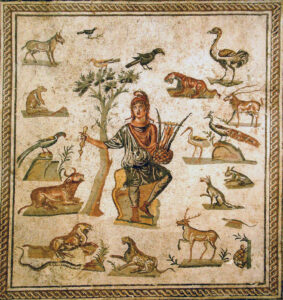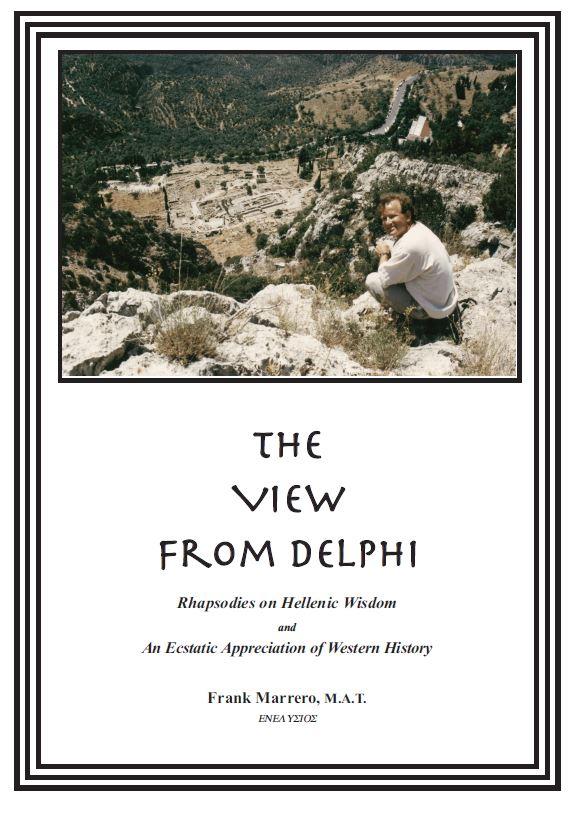Rhapsodies on Hellenic Wisdom &
An Ecstatic Appreciation of Western History
 Orpheus or Orphism is mentioned directly or implicitly in almost every major drama, philosophical treatise or theological rhapsody of the ancient Hellenes. The teachings ascribed to “Orpheus” were so thoroughly widespread in the ancient Hellenic world — especially in the formative pre-Socratic era — that Orphism could be said to be the spiritual background of the Hellenic miracle. But if asked to give a summary of “Orphism,” most would be taxed — all but the classicists, and even their answer would be “academic” in its portrayal. Yet, if we look carefully, that is, with a heightened spiritual sense, we can see that the tenets and teachings of Orphism merged into the very fabric of the Western mind — and by such interwoven familiarity has become essentially forgotten. It behooves us to transcend our blindness of familiarity and look with fresh eyes upon Orphism, not as a scholarly investigation and speculation– that has been done, but to behold a complex religion of wondrous force.
Orpheus or Orphism is mentioned directly or implicitly in almost every major drama, philosophical treatise or theological rhapsody of the ancient Hellenes. The teachings ascribed to “Orpheus” were so thoroughly widespread in the ancient Hellenic world — especially in the formative pre-Socratic era — that Orphism could be said to be the spiritual background of the Hellenic miracle. But if asked to give a summary of “Orphism,” most would be taxed — all but the classicists, and even their answer would be “academic” in its portrayal. Yet, if we look carefully, that is, with a heightened spiritual sense, we can see that the tenets and teachings of Orphism merged into the very fabric of the Western mind — and by such interwoven familiarity has become essentially forgotten. It behooves us to transcend our blindness of familiarity and look with fresh eyes upon Orphism, not as a scholarly investigation and speculation– that has been done, but to behold a complex religion of wondrous force.
We need only to look at Plato to see the pervasive effect of “Orpheus” upon Western civilization. And if Western philosophy is the footnotes of Plato (as proposed by the twentieth-century philosopher, Alfred North Whitehead), it could also be said that the pre-Socratics are the bibliography. The literature and legends of Orpheus, the Orphika, is then the inspirational source text. In fact, Plato, and many after him, could quote line for line from the legendary Orphika — usually on matters of the immortality of the “soul”. Speaking as a Westerner, our conception of our very souls is Platonic, and therefore imbued with “Orpheus.”
In the Phaedo, Plato honors Orphism in the very highest regards and twice equates the soul of “true philosopher” with that of the realisers of the Orphic mysteries. “For the initiated are in my opinion none other than those who have been true philosophers.” On his last day alive (according to Plato), Socrates did not speak of politics or Forms above forms, or even the kinds of love, but appropriately was full of “the ancient teachings” about the Underworld Orphic tour that the soul navigates after death.
Fortunately, we have an abundance of fragments about “Orpheus” and Orphism. Unfortunately, they are scattered along a millennia, from before and after recorded history and numbered time. In fact, the fragments are so scattered, old, and suspect, we cannot even “prove” that Orpheus himself ever existed. Indeed, the “evidence” is twofold that he was and wasn’t an actual historical person.
In fact, it has been debated for millennia whether Orpheus an historical person, a figure of legend, or a collection of stories. Certainly, he could be all of those things. Apollodorus bluntly states that Orpheus “invented the mysteries of Dionysus.” On the other hand, many (including Aristotle, over three hundred years after the time of “the Master”) claimed that Orpheus was a mythic creation from the “Rhapsodies” of Onomakritos — the court seer and revered “Orphic Initiator” for the ruler of Athens, Peisistratos. Others have attributed the twenty-four sheets of pure gold (the lamellae) inscribed with Orphic scripture to Pythagoras. The debate on Orpheus has gone on for twenty-four centuries and his corporeality has never been a scholarly certainty.
Rhapsodies on Hellenic Wisdom &
An Ecstatic Appreciation of Western History
